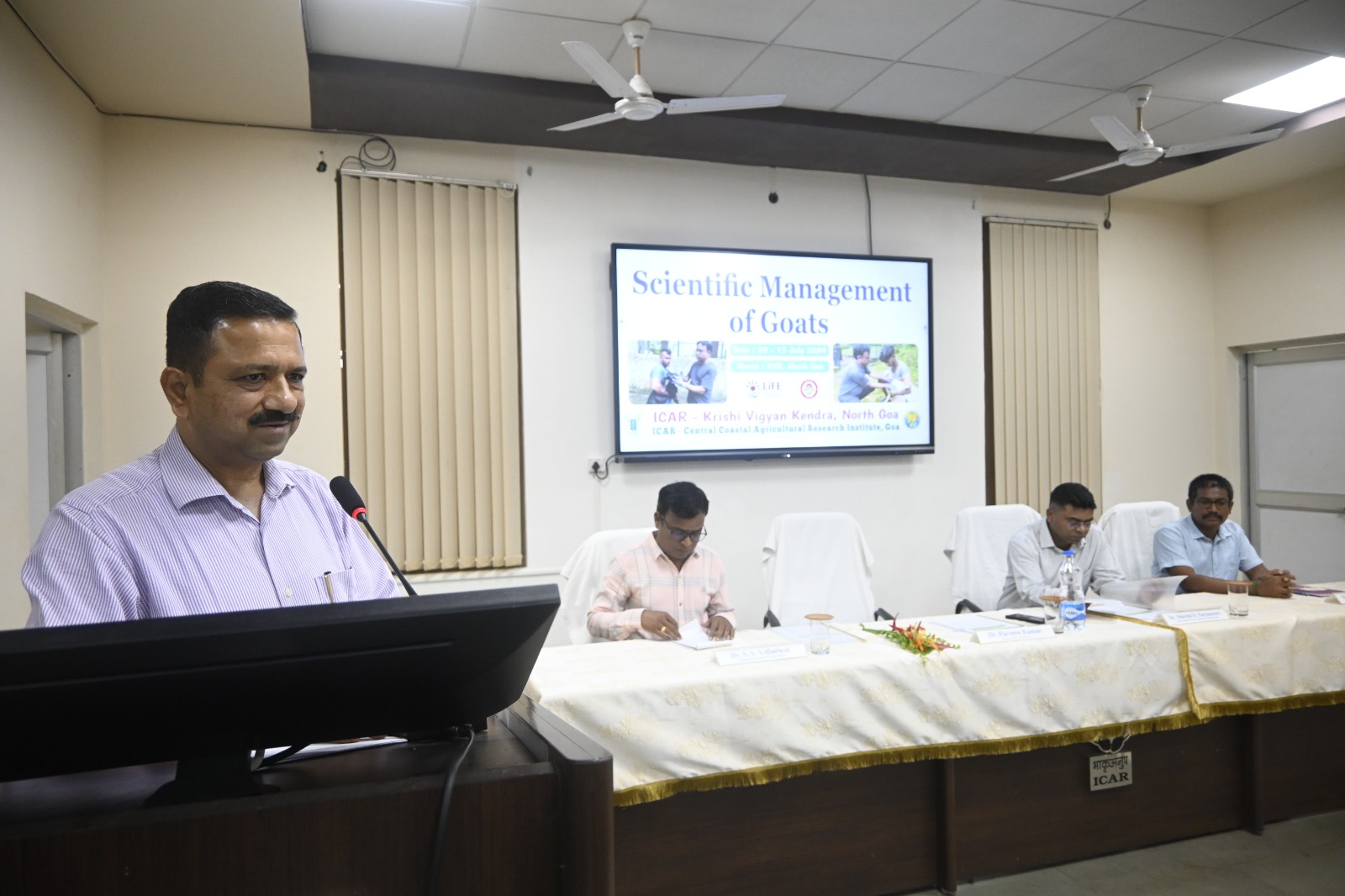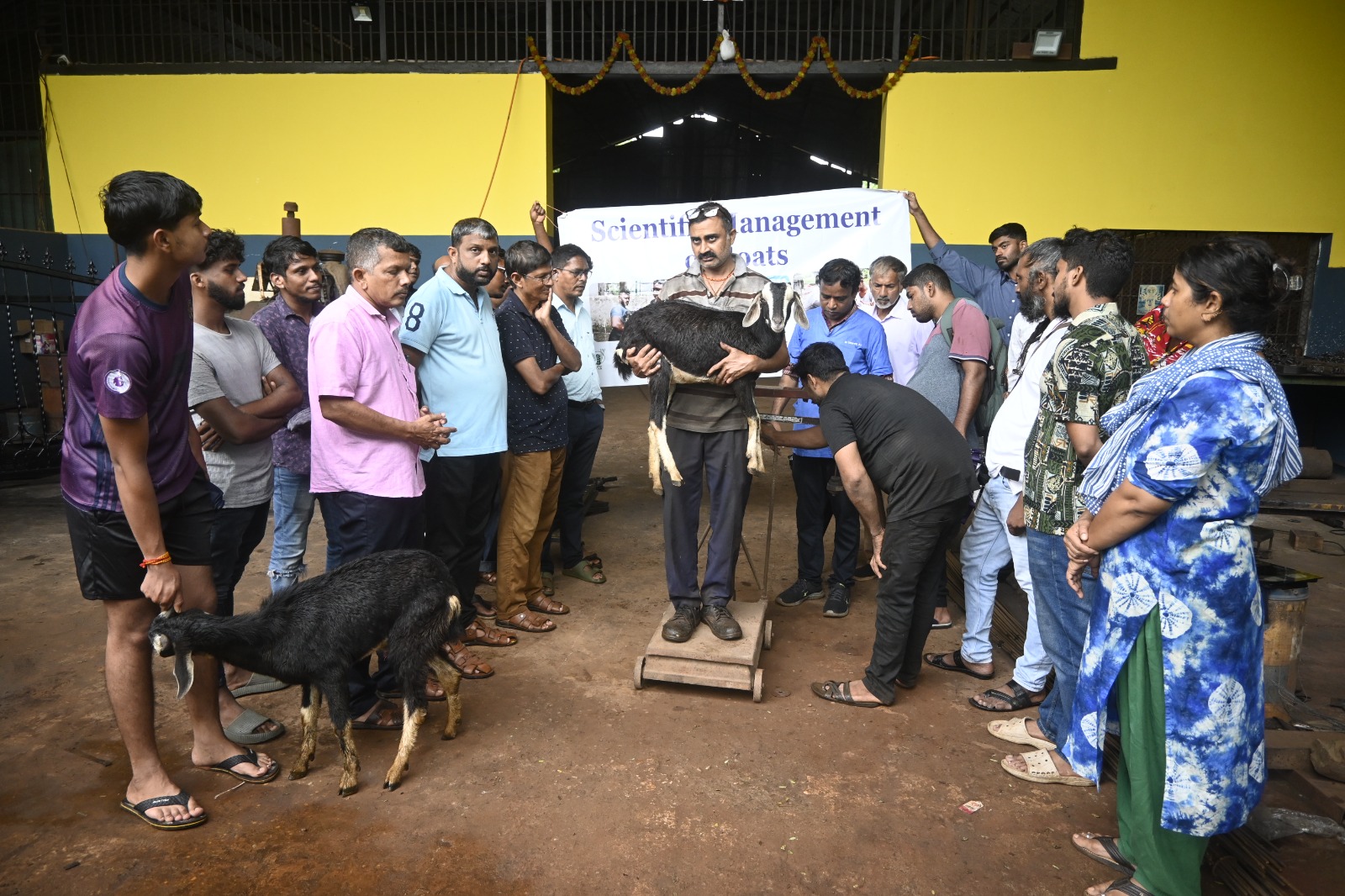Ministry of Agriculture &
Farmers Welfare
ICAR-KVK, CCARI, North Goa conducted vocational training on Scientific Management of Goats
Posted On:
19 JUL 2024 12:55PM by PIB Mumbai
ICAR-CCARI, KVK, North Goa held a seven-day vocational training program on Scientific Management of Goats from 9th-15th July 2024. Dr Parveen Kumar, Director, ICAR-CCARI, Goa, inaugurated the training programme and emphasized the Importance and scope of the goat farming in Goa. He recommended adding goat farming as an extra component to the existing Kulaghar agricultural system of Goa, which not only helps to boost soil fertility and crop yields after applying goat manure to the fields but also provides supplementary income to the rural youth via the sale of goat meat and milk.

Dr N. Bommayasamy, Senior Scientist Head, KVK, highlighted the long-term preservation techniques of dry and green fodder necessary for goats in the form of hay and silage and urged farmers to incorporate more fodder tree leaves to minimize goat farming costs. Dr Uthappa A.R., Scientist (Agroforestry), discussed the integration of fodder crops with coconut and other plantation crops. He discussed the production procedures for fodder trees which thrive in coastal climates. Dr. Manik Patil, Veterinary Officer, Department of Animal Husbandry and Veterinary Services (AHVS), Goa State, explained several AHVS schemes related to goat farming and advised participants to contact a nearby Veterinary Dispensary for goat treatment and vaccination. Mr Madina Sollapuri, ACTO (Civil Engn.), described the construction of a goat shed and suggested using low-cost woody materials such as coconut, areca nut, and bamboo to build a raised platform shed for goats. Mr. Vinod Ubarhande, ACTO (Farm Superintendent), provided a presentation on nursery management of fodder trees and their management. He advised farmers to use quality planting materials for good higher green fodder yields. Mr Rahul Kumar, SMS (Agronomy), talked about Azolla cultivation and its application as an alternative feed supplement for goats.

Dr Udharwar Sanjaykumar Vithalrao, Subject Matter Specialist (Animal Science), took hands-on training on goat handling, tagging and microchipping in goats, low-cost concentrate feed preparation, silage preparation, cultivation of hybrid Napier fodders, bloodless castration method, deworming and first aid in goats. He also talked about scientific feeding for the goats to improve breeding, kidding and total productivity. Dr Shirish Narnaware, Senior Scientist (Veterinary Pathology), discussed common viral and bacterial infections in goats and how to diagnose and treat them. He asked farmers to report goats viral and bacterial infections to the local Veterinary Officials and begin treatment under their supervision. Dr Solomon Rajkumar presented a talk on the value addition in goat meat and encouraged farmers to do the same. He explained the medicinal usage of goat milk and the possibilities for making goat milk paneer and soap. Dr Susitha Rajkumar, Senior Scientist (Veterinary Pathology), outlined in detail the vaccination and deworming schedules for goats and recommended farmers do regular deworming in both kids and adult goats, as well as the need to change deworming drugs regularly. Dr. Gokuldas, P. P., Senior Scientist (Animal Reproduction), discussed the scientific reproductive management of goats, focusing on the care and management of pregnant goats and breeding bucks. He encouraged farmers to change their breeding buck every two years to ensure healthy offspring and prevent inbreeding. Dr Gopal Mahajan, Senior Scientist (Soil Science), presented a talk on recycling goat manure and value addition. Dr. Sripad Bhat, Sr. Scientist (Agri. Economics), delivered a talk on the Economics of goat farming and recommended that participants use locally available resources to lower the cost of goat production. Dr Amiya Ranjan Sahu, Senior Scientist (Animal Breeding and Genetics), gave a lecture on the importance of Breeding management of goats and urged farmers to choose goats like Konkan Kanyal, Black Bengal and Malabari that perform well in coastal climates.
RKEW.jpeg)
Dr. Prasastha Vemula, Young Professional (Veterinary Public Health), described the zoonotic diseases of goats and urged farmers to do periodical laboratory tests related to significant zoonotic diseases. During the training, participants visited three goat farms in Aldona and Parra Villages, where farmers raised Konkan Kanyal and Sirohi goats semi-intensively.
On the occasion of the valedictory function, Dr A. Raizada, Principal Scientist (Agroforestry) and in-charge Director, distributed certificates to all participants, encouraged farmers to use the expert services of ICAR -CCARI and KVK in their future goat endeavor’s and wished all participants to become future goat entrepreneurs.
Dr Udharwar Sanjaykumar Vithalrao, Dr N. Bommayasamy, and Dr Susitha Rajkumar were the course directors who oversaw the program. Thirty-two rural youth (31 male and 1 female) from North and South Goa districts participated in the training program, including thirty-one males and one female.
***
Source : ICAR-CCARI, KVK, North Goa/NM/DY
सोशल मिडियावर आम्हाला फॉलो करा: @PIBMumbai
@PIBMumbai  /PIBMumbai
/PIBMumbai  /pibmumbai
/pibmumbai  pibmumbai[at]gmail[dot]com
pibmumbai[at]gmail[dot]com  /PIBMumbai
/PIBMumbai  /pibmumbai
/pibmumbai
(Release ID: 2034270)
Visitor Counter : 384